Ermete Zacconi (1857-1948) was a monstre sacré of the Italian theatre. He also acted in various Italian silent and sound films.
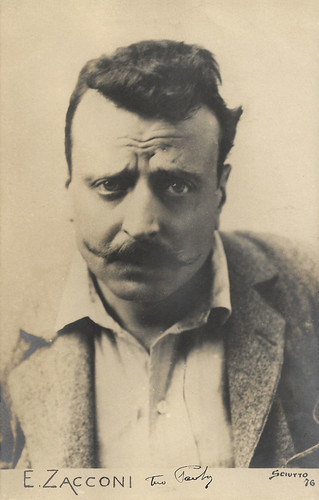
Italian postcard. Photo: Sciutto, no. 76.
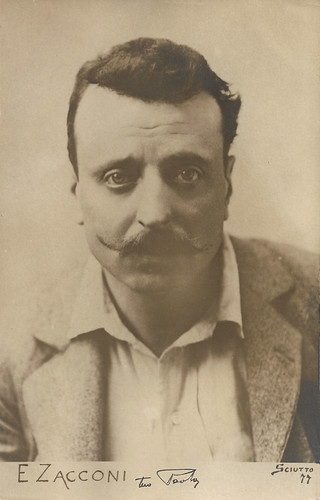
Italian postcard. Photo: Sciutto, no. 77.
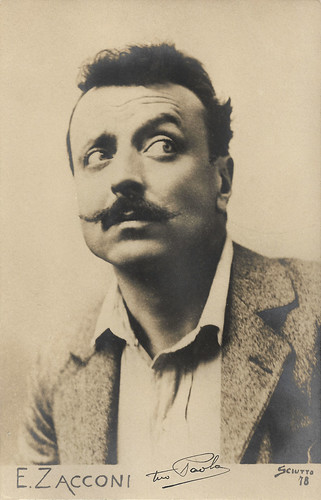
Italian postcard. Photo: Sciutto, no. 78.
Ermete Zacconi was born in Montecchio, Italy in 1857. He made his stage debut as a child, performing with his parents.
Over a period beginning in the 1880s, he held a leading position in troupes directed by G. Emmanuel, G. B. Marini, and V. Marini.
Zacconi developed as an actor during the period when naturalism was established in the Western European theatre. He became one of its most important representants. Following Emile Zola’s naturalism, this also included that he studied psychopathology, theories on the effects of heredity, and related subjects.
He did this in order to understand the psychology of man, in particular the clinical symptoms of an unhealthy psyche, which he reproduced with perfection. Zacconi’s most famous role was that of Oswald in Henrik Ibsen’s Spettri/Ghosts, reaching the maximum of realism with a shocking performance of the symptoms of the growing paralysis of the protagonist.
In Il cardinale Lambertini by Alfredo Testoni he did his most famous interpretation, showing a witty humour. His repertory also included the roles of Nikita in Lev Tolstoy’s The Power of Darkness, Kusovkin in Ivan Turgenev’s The Boarder, and Corrado in Paolo Giacometti’s La morte civile/Civil Death.
Zacconi also had lead roles in plays by Plato (Dialogues), William Shakespeare (King Lear, Othello), Carlo Goldoni, Alfred de Musset (Lorenzaccio), Alexandre Dumas fils, Ferenc Molnar, and August Strindberg.
After engagements with other companies, Zacconi organised his own troupe in 1894. He was worldwide appreciated, thanks to tours to France, Egypt, South-America and Russia.
At Eleonora Duse’s invitation, he performed with her troupe in 1899, 1901, and 1921. Zacconi’s leading actresses were his wife Ines Cristina Zacconi and Paola Pezzaglia.

Italian postcard by Alterocca, Terni, no. 2379. Photo: G. Rossi. Card is dated February 1904.

Italian postcard by Tip. Biondo, Palermo. Photo: Corrado. Ermete Zacconi in the stage play La morte civile by P. Giacometti.

Italian postcard by Ed. Vettori, Bologna, no. 43.

Italian postcard, no. 57. Photo Badodi, Milano.
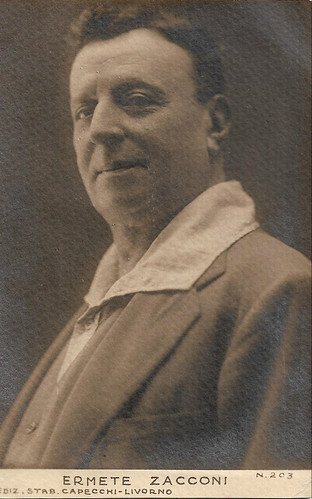
Italian postcard by Ed. Stab. Capecchi, Livorno, no. 203.
In 1912, Ermete Zacconi was won for the cinema. He made his film debut debuting with the spectacular melodrama Padre/Father (Dante Testa, Gino Zaccaria, 1912), based on a play by August Strindberg.
Padre narrates the story of an unjustly imprisoned businessman (Zacconi), who escapes and plots revenge on the culprit, his competitor. But he discovers the other has raised the convict’s daughter as his own, while the other man’s son is in love with the girl. The poor protagonist lets go, he even saves the culprit when a terrible blaze menaces to kill him. The other repents while dying, and indicates the girl her real father.
Padre was a success, inspiring other films with Zacconi such as Lo scomparso/The Dread of Doom (Dante Testa, 1913) and L'emigrante/The Emigrant (Febo Mari, 1915), the latter on the emigration of Italians to the United States.
After two more films, Gli spettri/The Ghosts (A.G. Caldiera, 1918) and La forza della coscienza/The power of consciousness (Luigi Romano Borgnetto, 1918), Zacconi left the screen and focused on the stage.
In the late 1930s, he returned to the set for Coeur de gueux/Cuor di vagabondo/Heart of a Vagabond (Jean Epstein, 1936) with Madeleine Renaud, Un colpo di vento/A blast (C.V. Tavano, 1936), Pioggia d'estate/Summer rain (Michele Badich, 1937), Les perles de la couronne/The Pearls of the Crown (Sacha Guitry, 1937) with Jacqueline Delubac, and Processo e morte di Socrate/Trial and Death of Socrates (Corrado d'Errico, 1939) with Rossano Brazzi.
During the Second World War, Zacconi performed in Orizzonte dipinto/Horizon painting (Guido Salvini, 1941), Romanzo di un giovane povero/Romance of a poor young man (Guido Brignone, 1942), Le comte de Monte Cristo, 1ère époque: Edmond Dantès/The Count of Monte Cristo, 1st episode: Edmond Dantes (Robert Vernay, 1943) featuring Pierre Richard-Willm, and Piazza San Sepolcro/San Sepolcro Square (Giovacchino Forzano, 1943) starring Vivi Gioi.
Ermete Zacconi died in 1948 in Viareggio. His son Giuseppe Zacconi would later produce the film Le avventure di Pinocchio/The Adventures of Pinocchio (Gianetto Guardone, 1947).
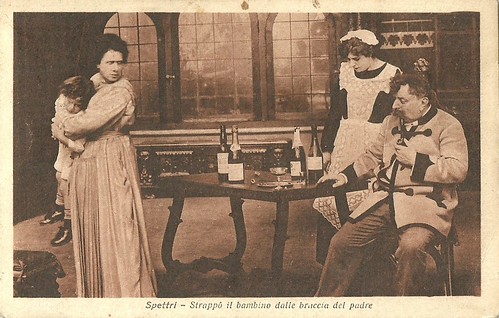
Italian postcard. Ermete Zacconi in the Italian silent film Spettri/Gli spettri (A.G. Caldiera, 1918), adapted from Henrik Ibsen's Ghosts (Gengangere, 1881). Caption: She grabbed the child from his father's arms. Helene Alving (Ines Cristina-Zacconi) and young Oswald (Peppino Zacconi), on the right captain Alving (Ermete Zacconi) and the maid, the mother of Regina.
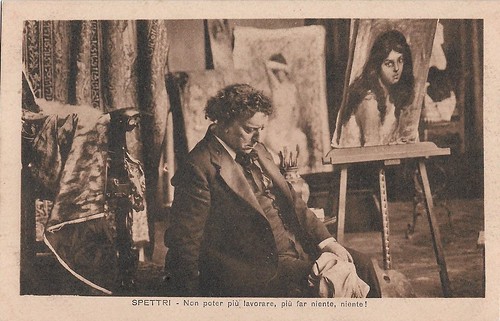
Italian postcard. Ermete Zacconi in the Italian silent film Spettri/Gli spettri (A.G. Caldiera, 1918), adapted from Henrik Ibsen's Ghosts (Gengangere, 1881). Caption: Not being able anymore to paint, to do anything, nothing!
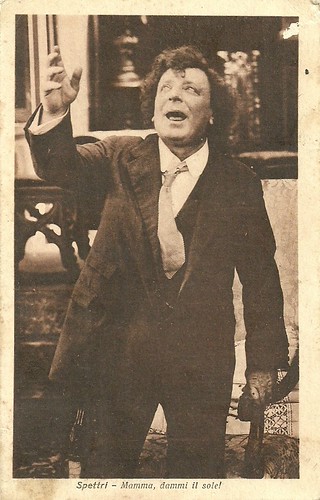
Italian postcard. Ermete Zacconi in Spettri/Gli spettri (A.G. Caldiera, 1918). Caption: Mama, give me the sun!
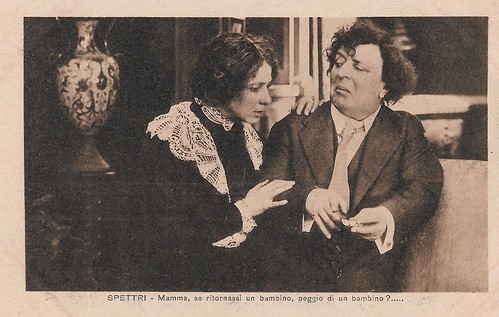
Italian postcard. Ermete Zacconi and Ines Cristina-Zacconi in Spettri/Gli spettri (A.G. Caldiera, 1918). Caption: Mama, what if I would become a child again, or even worse as a child?
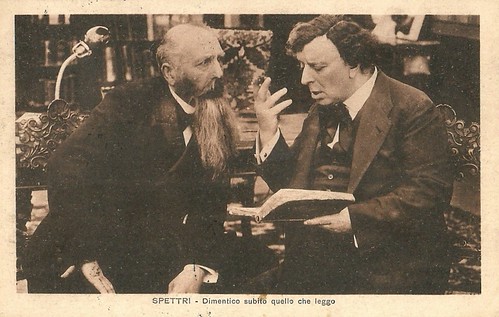
Italian postcard. Ermete Zacconi in Spettri/Gli spettri (A.G. Caldiera, 1918). Caption: I immediately forget what I have read. On the right Ermete Zacconi as Oswald/Osvaldo Halving. The man on the left could be Pastor Manders (Giovanni Grassi).
Sources: The free dictionary.com, Wikipedia (Italian and English), and IMDb.

Italian postcard. Photo: Sciutto, no. 76.

Italian postcard. Photo: Sciutto, no. 77.

Italian postcard. Photo: Sciutto, no. 78.
Ghosts
Ermete Zacconi was born in Montecchio, Italy in 1857. He made his stage debut as a child, performing with his parents.
Over a period beginning in the 1880s, he held a leading position in troupes directed by G. Emmanuel, G. B. Marini, and V. Marini.
Zacconi developed as an actor during the period when naturalism was established in the Western European theatre. He became one of its most important representants. Following Emile Zola’s naturalism, this also included that he studied psychopathology, theories on the effects of heredity, and related subjects.
He did this in order to understand the psychology of man, in particular the clinical symptoms of an unhealthy psyche, which he reproduced with perfection. Zacconi’s most famous role was that of Oswald in Henrik Ibsen’s Spettri/Ghosts, reaching the maximum of realism with a shocking performance of the symptoms of the growing paralysis of the protagonist.
In Il cardinale Lambertini by Alfredo Testoni he did his most famous interpretation, showing a witty humour. His repertory also included the roles of Nikita in Lev Tolstoy’s The Power of Darkness, Kusovkin in Ivan Turgenev’s The Boarder, and Corrado in Paolo Giacometti’s La morte civile/Civil Death.
Zacconi also had lead roles in plays by Plato (Dialogues), William Shakespeare (King Lear, Othello), Carlo Goldoni, Alfred de Musset (Lorenzaccio), Alexandre Dumas fils, Ferenc Molnar, and August Strindberg.
After engagements with other companies, Zacconi organised his own troupe in 1894. He was worldwide appreciated, thanks to tours to France, Egypt, South-America and Russia.
At Eleonora Duse’s invitation, he performed with her troupe in 1899, 1901, and 1921. Zacconi’s leading actresses were his wife Ines Cristina Zacconi and Paola Pezzaglia.

Italian postcard by Alterocca, Terni, no. 2379. Photo: G. Rossi. Card is dated February 1904.

Italian postcard by Tip. Biondo, Palermo. Photo: Corrado. Ermete Zacconi in the stage play La morte civile by P. Giacometti.

Italian postcard by Ed. Vettori, Bologna, no. 43.

Italian postcard, no. 57. Photo Badodi, Milano.

Italian postcard by Ed. Stab. Capecchi, Livorno, no. 203.
Padre
In 1912, Ermete Zacconi was won for the cinema. He made his film debut debuting with the spectacular melodrama Padre/Father (Dante Testa, Gino Zaccaria, 1912), based on a play by August Strindberg.
Padre narrates the story of an unjustly imprisoned businessman (Zacconi), who escapes and plots revenge on the culprit, his competitor. But he discovers the other has raised the convict’s daughter as his own, while the other man’s son is in love with the girl. The poor protagonist lets go, he even saves the culprit when a terrible blaze menaces to kill him. The other repents while dying, and indicates the girl her real father.
Padre was a success, inspiring other films with Zacconi such as Lo scomparso/The Dread of Doom (Dante Testa, 1913) and L'emigrante/The Emigrant (Febo Mari, 1915), the latter on the emigration of Italians to the United States.
After two more films, Gli spettri/The Ghosts (A.G. Caldiera, 1918) and La forza della coscienza/The power of consciousness (Luigi Romano Borgnetto, 1918), Zacconi left the screen and focused on the stage.
In the late 1930s, he returned to the set for Coeur de gueux/Cuor di vagabondo/Heart of a Vagabond (Jean Epstein, 1936) with Madeleine Renaud, Un colpo di vento/A blast (C.V. Tavano, 1936), Pioggia d'estate/Summer rain (Michele Badich, 1937), Les perles de la couronne/The Pearls of the Crown (Sacha Guitry, 1937) with Jacqueline Delubac, and Processo e morte di Socrate/Trial and Death of Socrates (Corrado d'Errico, 1939) with Rossano Brazzi.
During the Second World War, Zacconi performed in Orizzonte dipinto/Horizon painting (Guido Salvini, 1941), Romanzo di un giovane povero/Romance of a poor young man (Guido Brignone, 1942), Le comte de Monte Cristo, 1ère époque: Edmond Dantès/The Count of Monte Cristo, 1st episode: Edmond Dantes (Robert Vernay, 1943) featuring Pierre Richard-Willm, and Piazza San Sepolcro/San Sepolcro Square (Giovacchino Forzano, 1943) starring Vivi Gioi.
Ermete Zacconi died in 1948 in Viareggio. His son Giuseppe Zacconi would later produce the film Le avventure di Pinocchio/The Adventures of Pinocchio (Gianetto Guardone, 1947).

Italian postcard. Ermete Zacconi in the Italian silent film Spettri/Gli spettri (A.G. Caldiera, 1918), adapted from Henrik Ibsen's Ghosts (Gengangere, 1881). Caption: She grabbed the child from his father's arms. Helene Alving (Ines Cristina-Zacconi) and young Oswald (Peppino Zacconi), on the right captain Alving (Ermete Zacconi) and the maid, the mother of Regina.

Italian postcard. Ermete Zacconi in the Italian silent film Spettri/Gli spettri (A.G. Caldiera, 1918), adapted from Henrik Ibsen's Ghosts (Gengangere, 1881). Caption: Not being able anymore to paint, to do anything, nothing!

Italian postcard. Ermete Zacconi in Spettri/Gli spettri (A.G. Caldiera, 1918). Caption: Mama, give me the sun!

Italian postcard. Ermete Zacconi and Ines Cristina-Zacconi in Spettri/Gli spettri (A.G. Caldiera, 1918). Caption: Mama, what if I would become a child again, or even worse as a child?

Italian postcard. Ermete Zacconi in Spettri/Gli spettri (A.G. Caldiera, 1918). Caption: I immediately forget what I have read. On the right Ermete Zacconi as Oswald/Osvaldo Halving. The man on the left could be Pastor Manders (Giovanni Grassi).
Sources: The free dictionary.com, Wikipedia (Italian and English), and IMDb.
No comments:
Post a Comment